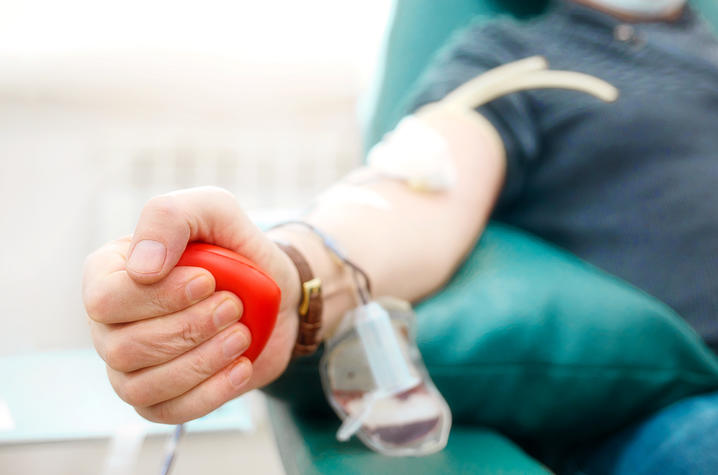Blood Donations Are Especially Critical During Trauma Season

The University of Kentucky Public Relations and Strategic Communications Office provides a weekly health column available for use and reprint by news media. This week's column is by Morgan H. McCoy, M.D., Ph.D., assistant professor of pathology and laboratory medicine at the University of Kentucky College of Medicine, and Zachary D. Warriner, M.D., trauma surgeon with UK HealthCare.
LEXINGTON, Ky. (July 5, 2022) — For many, Memorial Day weekend is seen as a yearly milestone to kick off the summer season. But while the arrival of summer can be exciting, Memorial Day weekend also is a signifier that “trauma season” has arrived.
Colloquially, “trauma season” represents the series of months in the year when warm weather and increase in outdoor activities results in a higher number of unintentional injuries requiring emergency care. As many of these injuries are potentially life-threatening, there is also an increase in the need for blood transfusions. In fact, a single critically injured patient has the potential to nearly deplete the hospital’s blood supply. Therefore, it is crucial for people to donate blood regularly if they are able.
The National Trauma Institute says that trauma accounts for 41 million emergency department visits and 2.3 million hospital admissions in the U.S. annually and remains the leading cause of death from ages 1 to 45 nationally. Often, the blood supply on hand in the hospital’s blood bank can mean life or death for patients with serious injuries.
Donated blood can provide several different lifesaving products: whole blood, red blood cells (RBC), plasma, platelets, and cryoprecipitate. All five of these products are used differently and are in critical need during trauma season. While O positive and O negative blood donors are known as the “universal RBC donors” and are always in high demand, all blood types are incredibly valuable and can help save lives across the nation.
Donating blood can seem intimidating, but it is actually much easier than one may think. Here are some tips for first-time donors:
- On the day of your donation, drink an extra 16 ounces of water before your appointment.
- Eat a healthy meal before arriving.
- Wear a shirt without sleeves or with sleeves that can roll up above the elbow.
- Relax, listen to music, talk to other donors or read while you donate.
After donating:
- Enjoy a salty snack and be sure to have iron-rich meals.
- Drink extra liquids and avoid alcohol for 24 hours.
- Keep your arm bandage on for the next several hours.
- Avoid any heavy lifting or vigorous exercise for the rest of the day.
Unsure if you can give blood? Here are some general guidelines for what a good candidate may look like:
- Be in good general health and feeling well.
- Be at least 17 years of age or older in most states.
- Weigh at least 110 pounds.
- Have not donated blood in the last 56 days.
Patients in need of blood come in many shapes and sizes, extending beyond the critically injured. Patients undergoing chemotherapy, premature babies, transplant patients, elective surgery patients and patients with a variety of other conditions may require blood transfusions as well. Therefore, blood donation is especially critical during trauma season, when the entire community’s need is higher than ever.
In Lexington, blood donations can be made at Kentucky Blood Center's two donor centers in Beaumont and Andover. To find donation sites or mobile drives outside of Lexington, or to schedule an appointment, visit www.kybloodcenter.org/find-a-drive or call 800-775-2522. Face coverings are required while donating. There is no wait time to donate after receiving the COVID-19 vaccine.
Both Lexington KBC locations are open from 9 a.m.-6 p.m. Monday-Friday and 8 a.m.-2 p.m. Saturdays.
Andover Donor Center
3130 Maple Leaf Drive, Lexington
Beaumont Donor Center
3121 Beaumont Centre Circle, Lexington
As the state’s flagship, land-grant institution, the University of Kentucky exists to advance the Commonwealth. We do that by preparing the next generation of leaders — placing students at the heart of everything we do — and transforming the lives of Kentuckians through education, research and creative work, service and health care. We pride ourselves on being a catalyst for breakthroughs and a force for healing, a place where ingenuity unfolds. It's all made possible by our people — visionaries, disruptors and pioneers — who make up 200 academic programs, a $476.5 million research and development enterprise and a world-class medical center, all on one campus.




